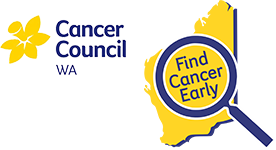Find Cancer Early Program
Overview
People living in regional Australia have lower rates of five-year survival for all cancers combined, compared with people living in major cities¹.
Find Cancer Early is a public health campaign that aims to reduce the disparity in cancer outcomes between metropolitan and regional Western Australia (WA). Program strategies include increasing community symptom awareness and addressing the barriers and myths around seeking help from a doctor.
Find Cancer Early focuses on the five most common cancers in WA – prostate, breast, skin, bowel and lung – and targets people over the age of 40 years, living in regional WA. There is a particular focus on hard to reach sub-populations such as Aboriginal and Torres Strait Islander peoples and people living in remote communities. Cancers found in these groups comprise almost 60 per cent of all cancer diagnoses in WA.
Background and History
Find Cancer Early was first developed and implemented by Cancer Council WA in 2011 as part of the Improving Rural Cancer Outcomes Partnership Project with the Western Australian Department of Health and the University of Western Australia.
Established in 2009, Improving Rural Cancer Outcomes looked into why regional people have poorer cancer outcomes. It was identified that people living in regional WA have poor symptom awareness, delay seeking help from a doctor and experience bottle necks in the diagnostic pathway.
The team was then awarded a five year National Health and Medical Research Council partnership grant to trial how to improve the situation. As a result, Find Cancer Early was born.
Find Cancer Early Phase 1
November 2011-November 2013
In Phase 1 of Find Cancer Early, a 2×2 factorial cluster randomised control trial was used to test whether general practitioner (GP) and community interventions could reduce the time to diagnosis in regional cancer patients.
2 areas were identified:
- Area A: Wheatbelt, Goldfields, Great Southern regions received the community intervention and half of GP clinics received the GP intervention
- Area B: Midwest and Southwest regions received no community intervention (to serve as a control) and half of GP clinics received the GP intervention
- The Kimberley and Pilbara regions were excluded due to geographical remoteness and demographic differences making the populations less comparable for study purposes.
2 interventions were implemented:
- Community Intervention: project staff on the ground delivered community education sessions and disseminated campaign resources
- GP Education Intervention: project staff on the ground provided positive predictive value resources and delivered academic detailing education sessions to GPs to streamline regional cancer diagnostic and referral pathways.
Evaluation: A Computer-Assisted Telephone Interview (CATI) survey was conducted at the end of the campaign to measure the differences in campaign awareness, knowledge and early-help seeking behaviour amongst campaign and control regions. The survey found that only 20.4 per cent of people in the control regions were aware of the Find Cancer Early campaign, while 61.4 per cent of people in the campaign regions were aware of the campaign². Special thanks to the Lishman Health Foundation for funding this evaluation which was instrumental in later advocacy for ongoing program funding.
Find Cancer Early Phase 2
October 2014-July 2016
In Phase 2 of Find Cancer Early, skin cancer was added to the suite of focus cancers. Cancer Council WA funded and coordinated a state-wide television and radio campaign to keep the message alive. The “Rural Doctors Bathroom” television commercial featuring five real rural WA general practitioners was created.
Evaluation: A second survey was conducted at the end of the campaign and showed campaign awareness throughout all regional WA (excluding Kimberley and Pilbara) was 64 per cent and recognition of the television advertisement alone was 48.3 per cent. A comparison of the first two surveys demonstrated no significant differences between total campaign awareness, indicating that the community intervention delivered by the project staff on the ground was equally effective as the mass media campaign³.
Program Advocacy
Cancer Council WA advocated for continued support in the lead up to the 2017 State Government election and received $1.6m for 4 years from the WA Department of Health to continue and expand Find Cancer Early across regional WA.
Find Cancer Early Phase 3
August 2017-July 2021
- 7 Regional Education Officers are delivering community education sessions, disseminating campaign resources, partnering with local stakeholders and attracting local media across regional WA
- Messages are disseminated through mass media, including television, radio, press, online (Facebook, Google, Gmail and Youtube) and public bathroom signs.
- Messages are also disseminated through social media, including Facebook and Instagram.
Evaluation: The third survey was conducted at the end of the campaign and showed campaign awareness throughout regional WA was 69.3 per cent.
Campaign resources
Visit the Find Cancer Early Resource Hub.
Further information
- Call Cancer Council WA cancer nurses on 13 11 20
- Order or download resources such as checklists, posters and postcards
- Contact Cancer Council WA Regional Education Officers based in Broome, Dampier, Geraldton, Kalgoorlie, Northam, Bunbury and Albany.
- Contact Cancer Council WA Find Cancer Early Coordinator Leanne Spano based in Subiaco for more information about the program.
¹Australian Institute of Health and Welfare. Cancer in Australia 2021. Cancer series no. 133. Cat. no. CAN 144.
Canberra: AIHW; 2021.
² Croager EJ, Gray V, Pratt IS, Slevin T, Pettigrew S, Holman CD, Bulsara M and Emery J (2018) Find Cancer Early: Evaluation of a Community Education Campaign to Increase Awareness of Cancer Signs and Symptoms in People in Regional Western Australians. Front. Public Health 6:22. doi: 10.3389/fpubh.2018.00022
³ WA Cancer Prevention Research Unit (WACPRU). Evaluation of the Find Cancer Early Campaign: Stages 1 and 2. Perth: WACPRU (2016).
⁴ WA Cancer Prevention Research Unit (WACPRU). Find Cancer Early Phase 3 CATI Evaluation. Perth: WACPRU (2019).
